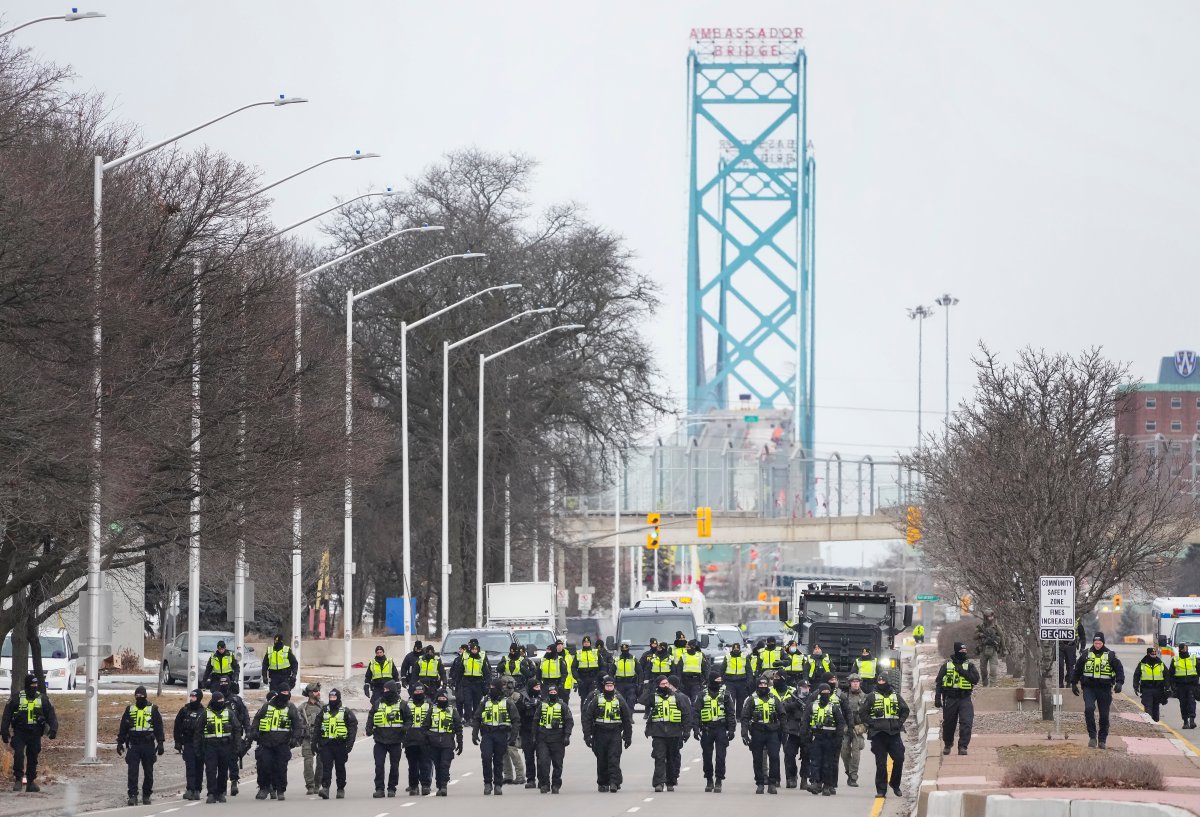Tuesday marked the anniversary of the launch of a near week-long disruption on the Ambassador Bridge in Windsor, Ont., North America’s busiest land border crossing.

The international trade corridor, which links Windsor with Detroit, facilitates nearly a quarter of the trade activity between Canada and the U.S., handling roughly $400 million in goods travelling between the two neighbours on a daily basis.
The blockade, which was organized as a protest against COVID-19 pandemic mandates and restrictions, lasted rough six days and halted an estimated nearly $4 billion in trade activity.

Since then, the federal government passed Bill 100, also known as the Keeping Ontario Open for Business Act, which includes “legislative measures to enable police officers to better protect international border crossings.”
Last year, the government also set aside $6.9 million to cover the costs associated with the protests.
The actual amount Windsor will receive is still under discussion, according to officials, but the city had asked for millions in compensation for the cost of business closures and restoring public order at the crossing.
Global News recently spoke with Windsor Mayor Drew Dilkens about the anniversary of the blockade, where the city is now in terms of recovery, and what officials have taken away from the experience.
The following is the transcribed interview between Mayor Dilkens and The Morning Show host Devon Peacock.
What do you remember about this time last year?
It was certainly a pretty chaotic time here on the streets leading up to the Ambassador Bridge. What had started off as a slow roll protest, meaning 100 or 150 vehicles moving very slowly on the roadway leading to the Ambassador Bridge, but always allowing traffic to move to and from the bridge, became a sudden blockade.
And the sudden blockade, of course, — living in a border community like ours where you have supply chains and the auto sector built up on both sides of the border — it quickly became a very problematic and costly situation.
It felt like a whole lot longer. The pressure is immense, and I can tell you our largest employer Stellantis, because we make the Chrysler minivan here and the Pacifica, within 60 minutes, they had called to say “What is going on at the Ambassador Bridge?’ because the whole auto industry operates on “just in time” delivery basis.
Were you concerned it was going to go on longer than six days?
I never thought it would last the week that it lasted. I thought that it would be resolved much more quickly. But the temper on the ground, and the temperature and the language being used by some of the protesters, they outright said, “This is a cause we’re going to die for.”
They hardened their position, and that made police step back and make sure that everyone could go home at the end of the night and not be injured. Of course, it led to a request for additional police resources in the city of Windsor. Well, what we requested and what was sent here, I mean, they sent five times more officers and we requested to deal with that situation.
Ultimately, it was resolved, and no one was injured. We had a court injunction that was issued, and you saw Premier Ford make legislative changes that I think are probably the most important change that has happened as a result of this blockade.
The new legislation in place really ought to give any reasonable or sensible person a pause to think twice about undertaking this type of behaviour, because the consequences are now so high.
To that point, do you think a blockade could happen again or not because of that legislation?
Well, we have the legislation, the injunction which is permanent. It’s in place still, so it gives police another arrow in the quiver, so to speak. But to your question, could it happen again? Absolutely.
This is an interesting construct that we have that goes back nearly 100 years with the Ambassador Bridge, which is the busiest border crossing between the United States and Canada. It’s unique in that it’s privately owned, and it is also under the control of federal regulation. That’s on one end.
On the other end of the municipal roadway is the provincial highway, the 401 Series. So, you have a provincial highway that dumps trucks onto a municipal roadway, leading up to a federal border crossing.
There is nothing that we could do to permanently harden the existing infrastructure. It’s about three kilometres long in each direction, and multiple access points for businesses, and there are still some residential homes on Huron Church Road, leading to the Ambassador Bridge. So, there’s nothing we can do to permanently harden that.
So, could it happen again? Sure. But I think looking at it with the existing legislative tools and court injunctions in place, anyone contemplating that type of behaviour, again, certainly would face very, very significant consequences.

You mentioned the economic impact of the blockade and just how important the Ambassador Bridge is for trade, and for a lot of different reasons. I hesitate to call it a positive, but is there a better appreciation of the importance of the bridge one of the outcomes of this experience?
I think what it really does is it highlights the fact that Canada is a trading nation, and the busiest border crossing, with our largest trading partner in the U.S., when that gets blocked, that doesn’t just impact families here in Windsor Essex County. That impacts families across our country and across the province of Ontario.
When the bridge is closed and they can’t move goods to market, that means it’s literally taking bread off the table of Ontarian and Canadian family tables. That’s where I think this one-week issue a year ago certainly highlighted the importance of this border crossing, and making sure that it’s always running in a safe and efficient way.
Did we learn anything from the experience? What would you take away from it moving forward?
I think there are probably a number of things. The biggest issue, I think, if we look back, is the need for faster intervention, and making sure we don’t let folks harden on the roadway and really set up the bouncy castles and the hockey games and the other types of things that were going on.
It was a tumultuous time. We were on the tail end of a lockdown, sort of a final lockdown related to COVID, and people were angry. So that was playing out and you also had sort of an anti-government narrative playing out. There were a number of things that came together that helped fuel what happened at Ottawa, that helped fuel what happened here on the roadway leading to the Ambassador Bridge.
I think we’re probably, for the most part, past that really strange time in all of our lives, having lived through COVID. But, you know, ultimately, I think just faster action and making sure we have the right resources in place here locally, like a public order unit with police and some other tools that would help them be able to provide a timelier response, will certainly minimize the chance of this happening again.
— with files from Global News’ Devon Peacock, Craig Lord, and Gabby Rodrigues.








Comments